How Do Family Triggers Relate To An Addiction?

Exploring Deep Roots: Family and Addiction
Family often plays a pivotal role in the development and recovery from addiction. While genetic predispositions are significant, the environmental and emotional backdrop provided by family life heavily influences an individual's relationship with substances. Understanding family triggers is crucial in addressing addiction and fostering long-term recovery.
Unraveling Family Dynamics in Addiction
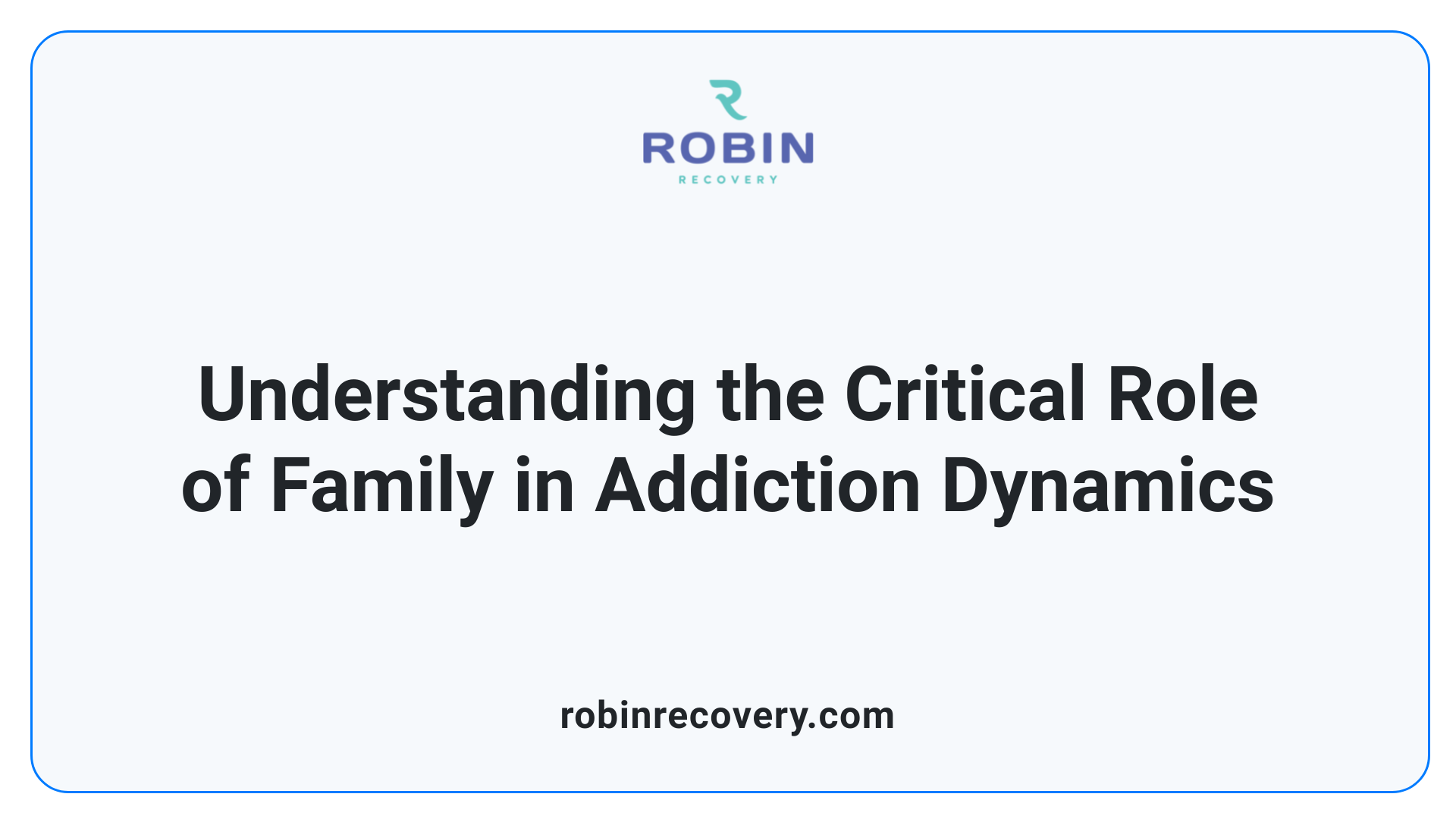
What role do family dynamics play in addiction?
Family dynamics have a profound influence on addiction, impacting both the individual struggling with substance use and the overall family unit. Parents battling substance abuse issues often create chaotic environments that can result in neglect of their children's emotional and physical needs. This neglect can lead to adverse developmental outcomes, significantly heightening the risk of those children developing addiction issues themselves.
Moreover, the intergenerational nature of addiction often perpetuates this cycle. Children raised in households where substance use is normalized may internalize coping mechanisms that include substance abuse, as they also carry the emotional scars from their upbringing. Studies indicate that these children are more susceptible to mental health problems like anxiety and depression, further complicating their relationship with substances in later life.
How do enablers affect the recovery process?
In many families, certain members take on roles that can either facilitate or hinder recovery. Enablers, for instance, often act with good intentions, shielding the addicted individual from the harsh consequences of their actions. This behavior may protect the individual temporarily but ultimately undermines their motivation to seek help, as it allows substance use to persist without accountability.
What is the impact of intergenerational addiction?
The impact of intergenerational addiction can be seen in how familial patterns of substance use are passed down through generations. Children of addicted parents frequently face a higher likelihood of developing their own substance use disorders, not only due to genetic predispositions but also through environmental influences. When addiction permeates a family, it creates a cycle that is challenging to break. Understanding and addressing these dynamics is crucial for promoting healthier relationships and effective recovery efforts.
The Intergenerational Cycle of Addiction
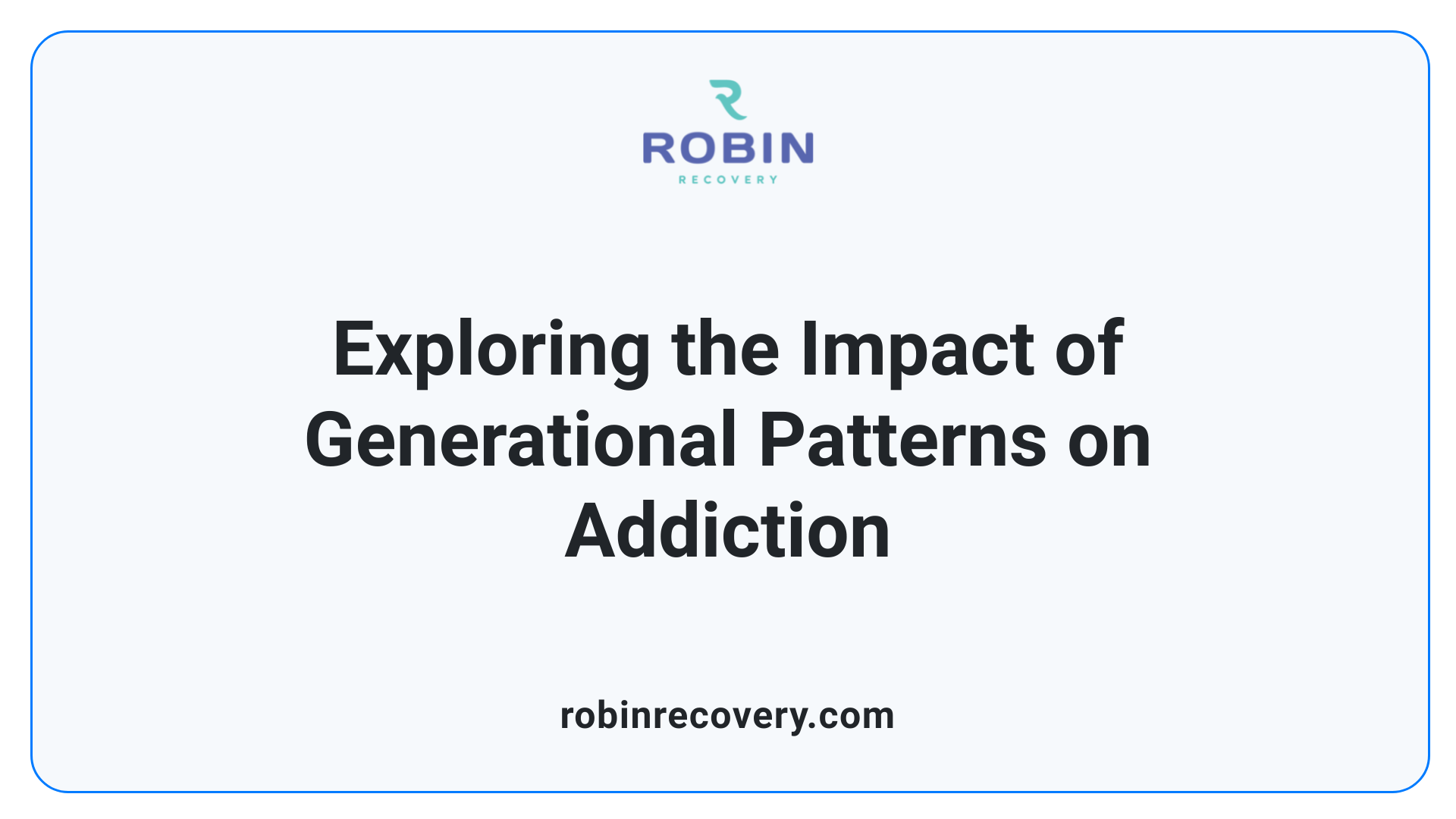
What factors affect drug abuse within families?
Multiple factors contribute to drug abuse within families, creating a complex web that often perpetuates addiction across generations. Dysfunctional family dynamics play a pivotal role. Families that exhibit communication issues, neglect, or abusive behaviors significantly increase the risk of children developing substance use disorders.
- Genetic predispositions: Children of parents with substance use disorders (SUDs) face a higher likelihood of encountering similar issues. Statistics show that 1 in 10 children grow up with at least one parent struggling with addiction, causing not only emotional distress but also leading to significant developmental risks.
- Environmental influences: The environment plays a critical role in shaping behaviors and attitudes toward substance use. Living in a chaotic home increases stress levels, which can complicate emotional development and result in an increased propensity for younger family members to mimic substance use behaviors.
- Financial strain: Addiction typically brings financial burdens, which can foster a hostile family environment, leading to further emotional neglect of children. Economic stress compounds existing issues, creating a cycle that is tough to break.
In addition to these factors, elements like peer influence and the accumulation of adverse childhood experiences (ACEs) can further complicate situations. Ultimately, the intersection of genetics, environment, and existing family dynamics shapes the landscape of addiction within families.
Childhood Trauma: Seeds of Addiction
How does childhood trauma influence addiction patterns?
Childhood trauma plays a pivotal role in shaping addiction patterns, often laying the foundation for future substance use disorders. Research indicates that children who experience adverse childhood experiences (ACEs), such as physical or emotional abuse, are significantly more likely to face addiction issues as adults. This connection stems from the emotional and psychological scars that trauma inflicts, leading to maladaptive coping strategies.
Individuals who are subjected to childhood trauma may struggle with emotional dysregulation, resulting in overwhelming feelings of anxiety, depression, and helplessness. In their attempt to cope with these distressing emotions, many turn to substances—drugs or alcohol—as a means of escape or numbness. The cumulative nature of ACEs—where one traumatic event compounds the effects of others—further exacerbates the vulnerability to addiction.
The implications are profound: those with multiple ACEs show an increased susceptibility to impulsive behaviors and difficulties in establishing healthy relationships. This highlights the importance of early intervention and trauma-informed care in addressing these issues. Helping individuals process their childhood experiences can significantly reduce the propensity for substance abuse, fostering healthier coping mechanisms and emotional stability.
In addressing the roots of addiction, recognizing the impact of childhood trauma is essential for creating effective treatment plans that aim not only for sobriety but also for emotional healing.
Family Roles and Addiction: Breaking the Cycle
How do family dynamics contribute to drug abuse?
Family dynamics significantly influence drug abuse patterns, especially through emotional regulation and interpersonal conflict. For example, children with substance-using fathers often display higher rates of neurobehavioral disinhibition, which increases their susceptibility to substance use later in life.
Moreover, conflict within family relationships, particularly with mothers, emerges as a strong indicator of diminished abstinence self-efficacy. Individuals facing ongoing conflict with maternal figures tend to struggle more with maintaining sobriety, highlighting the need for supportive and nurturing family environments.
The role of dysfunctional dynamics
Dysfunctional family dynamics can perpetuate cycles of addiction. Families affected by substance misuse often experience poor communication, enabling behaviors, and emotional neglect, all of which create an unstable environment. This instability can lead children to internalize unhealthy coping mechanisms, increasing the likelihood of addiction in adulthood.
Understanding enabling behaviors
Enabling behaviors in families can further complicate the recovery process. When family members shield the addicted individual from the consequences of their behavior, it undermines motivation for change. Recognizing and altering these enabling patterns is crucial for fostering healthier interactions and effectively supporting recovery efforts.
Identifying the impact of family roles, addressing dysfunction, and managing enabling behaviors can be vital steps in breaking the intergenerational cycle of addiction.
The Profound Impact of Addiction on Families
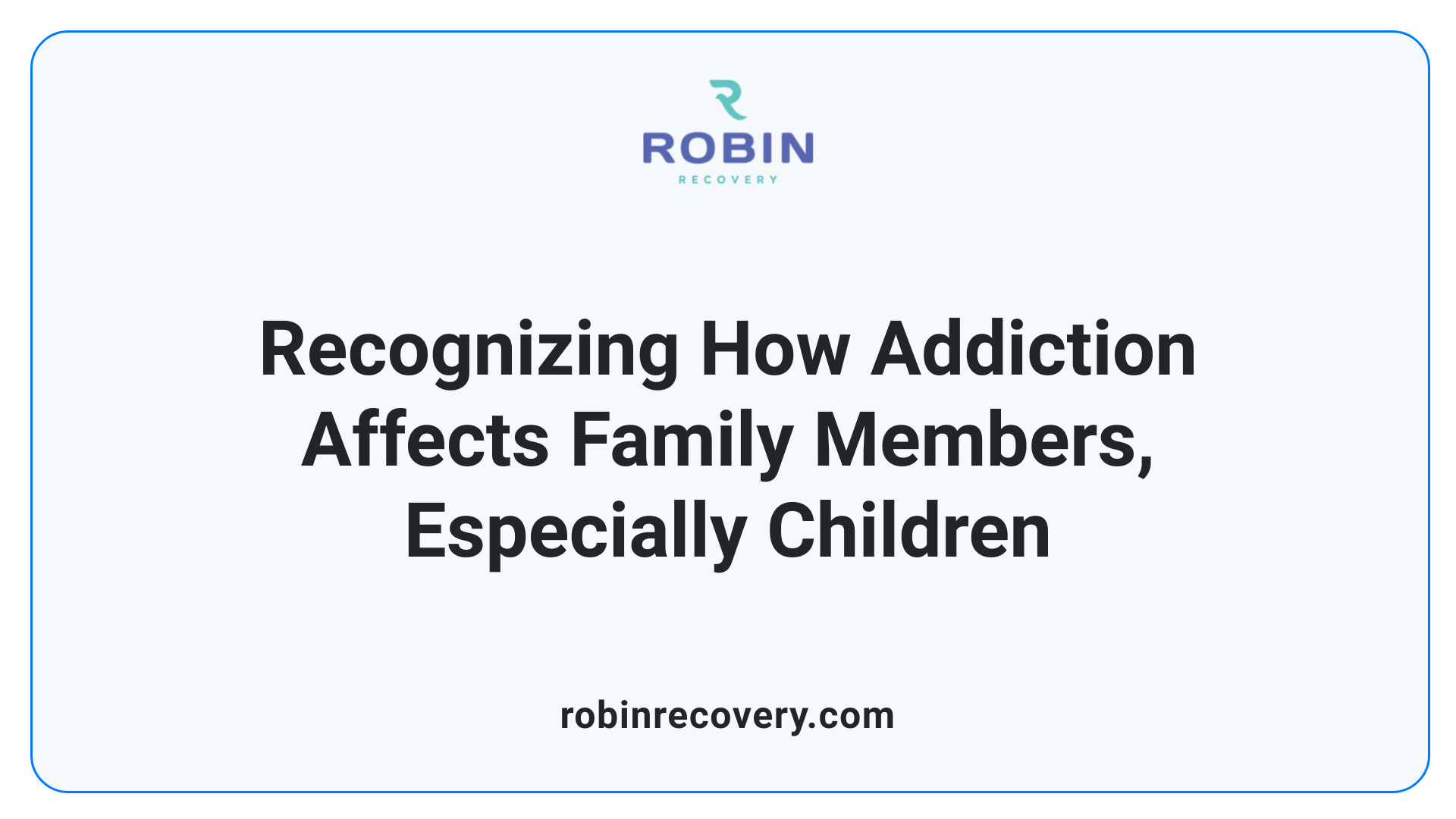
What is the impact of addiction on family members, particularly children?
Addiction significantly influences family dynamics, especially impacting children. Children of parents with substance use disorders (SUDs) face numerous emotional, psychological, financial, and social challenges. They are more vulnerable to issues such as neglect and abuse, increasing their risk of developing their own substance use disorders, perpetuating a distressing cycle of addiction.
The emotional landscape of a household affected by addiction is often fraught with distrust and betrayal. Family relationships can deteriorate under the stress caused by addiction, leading to poor communication and difficult dynamics. Children might witness erratic behaviors that shape their understanding of relationships, which can lead to low self-esteem and anxiety.
Furthermore, addiction places significant financial strain on families. The costs associated with treatment, loss of income, and day-to-day financial instability contribute to family tensions. This environment can create disruption in essential family roles, with children stepping into caregiver roles or other responsibilities far too early in life.
Supporting Recovery Through Family Engagement
Effective recovery from addiction necessitates the involvement of the entire family. Engaging family members in treatment not only aids in healing the primary individual but also helps in restoring and strengthening family relationships. By promoting open communication and understanding, families can navigate the challenges posed by addiction together, enhancing their chances for long-term recovery. Addressing these issues holistically is essential to breaking the cycle of addiction and fostering a supportive home environment.
Therapeutic Approaches to Family and Addiction
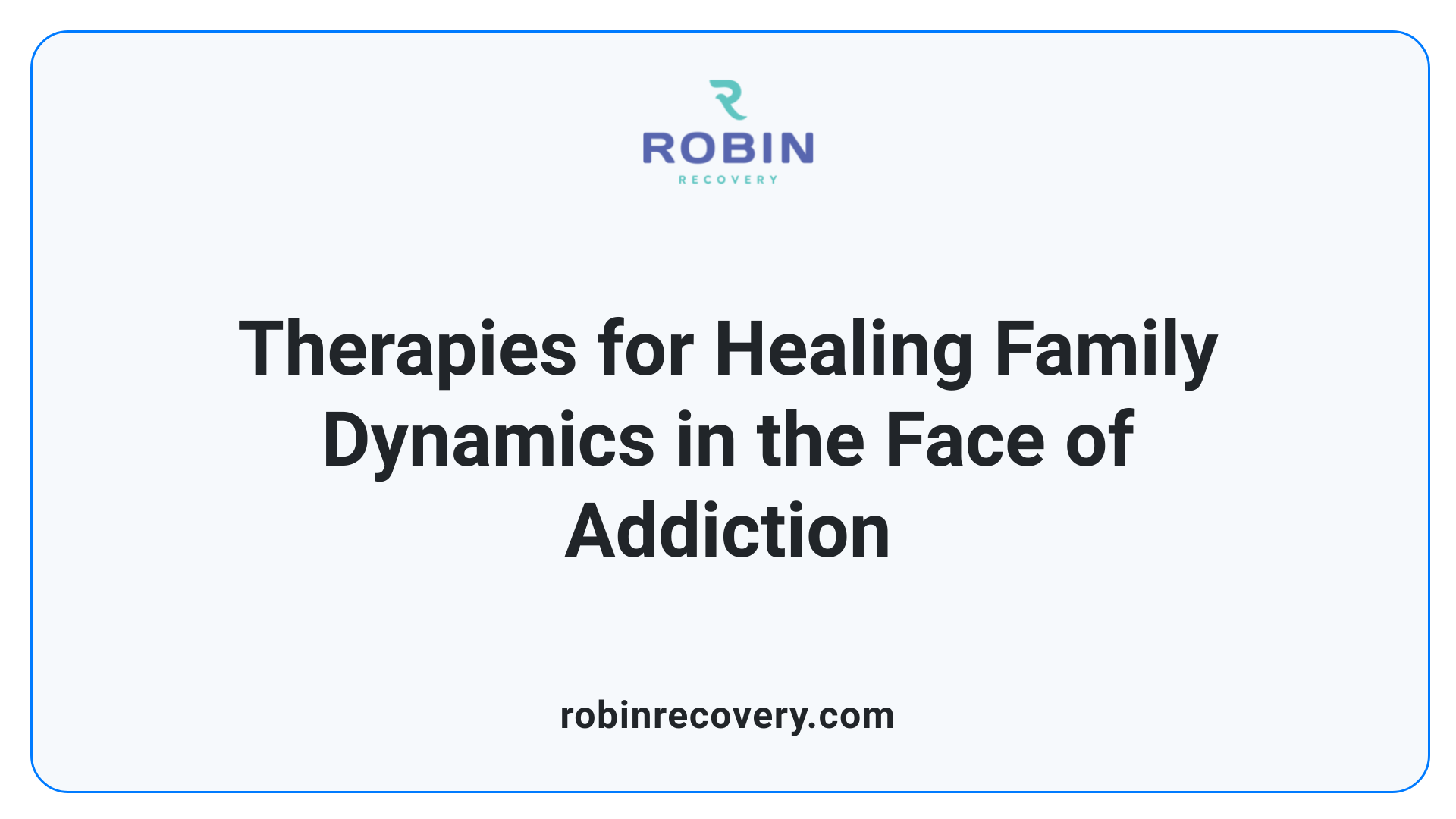
What therapeutic approaches can be used to address family dynamics in addiction?
Therapeutic approaches to address family dynamics in addiction are vital in promoting recovery and restoring relationships. One significant approach is family therapy, which serves to improve communication among family members and resolve conflicts that may arise due to addiction. This method allows families to explore the roles they play in the addiction cycle—such as the addict, the caretaker, and the hero—while identifying and addressing harmful enabling behaviors that may inadvertently support substance use.
Support groups like Al-Anon offer a crucial lifeline for families affected by addiction. These groups provide a space where family members can share experiences, gain emotional support, and learn coping strategies that help them navigate their feelings and assist their loved one in recovery.
Furthermore, engaging in therapy can heighten awareness about family roles and dynamics. Understanding these roles plays a critical part in breaking the cycle of addiction and fostering healthier interactions. Education about interpersonal relationships can empower all family members, making them active participants in the healing process.
Incorporating these therapeutic strategies creates a comprehensive framework that involves the entire family, enhancing recovery for the individual struggling with addiction while also nurturing the emotional needs of family members.
Preventing Addiction Through Family Interventions
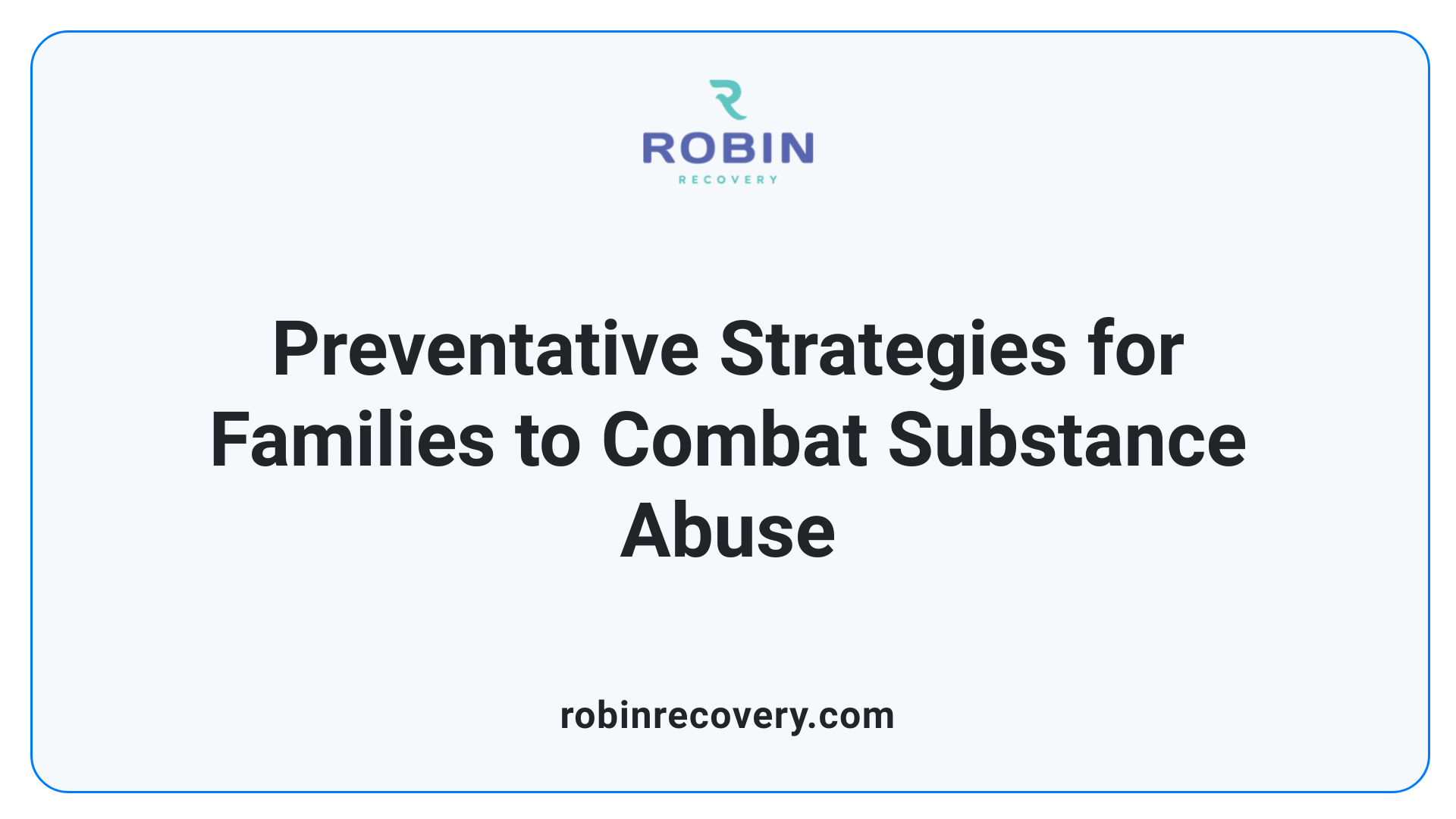
How can families prevent substance abuse?
Families can play a vital role in preventing substance abuse by focusing on early identification and intervention strategies. It's important to be vigilant for signs such as emotional unavailability, behavioral changes, poor communication, and withdrawal from social interactions. When family members notice these signs, open and honest conversations about substance use become essential.
Establishing a supportive environment is crucial. Families should aim for open dialogues without judgment, ensuring that at-risk individuals feel safe discussing their struggles. Addressing unhealthy family dynamics, like conflicts or financial strains, can significantly contribute to a healthier home environment.
Healthy communication
Effective communication enhances understanding among family members. Encouraging discussions about feelings, expectations, and concerns fosters emotional connections and reduces isolation. This approach discourages stigma around addiction and promotes a sense of belonging, integral for at-risk youth.
Boundary setting
Furthermore, setting clear and healthy boundaries is crucial. Families should work together to define acceptable behaviors and responsibilities, helping to avoid codependency and creating healthier dynamics. This proactive stance can safeguard against the development of substance abuse patterns, supporting long-term emotional and psychological well-being among all family members.
In summary, through early identification, healthy communication, and boundary setting, families can create a supportive network that significantly reduces the risks of addiction.
Coping with Family-Related Triggers in Recovery
What are some coping strategies for managing family-related addiction triggers?
Managing family-related triggers in recovery requires both awareness and proactive coping strategies. First and foremost, it’s essential to identify specific triggers—these may be emotional, such as stress or anxiety stemming from family dynamics, or external, like environments associated with past usage. Recognizing these can help individuals anticipate situations that may provoke cravings or temptations.
Setting boundaries is crucial. This means distancing oneself from toxic relationships that enable old behaviors and fostering connections with supportive family members who encourage sobriety. Those in recovery should engage with healthy communication practices, promoting honest dialogue about feelings and needs.
Support systems
Building a robust support network can significantly bolster recovery efforts. Engaging in recovery communities, such as Alcoholics Anonymous (AA) or Narcotics Anonymous (NA), facilitates shared experiences and mutual encouragement. Additionally, support groups specifically tailored for family members can educate individuals about addiction, fostering empathy and understanding.
Healthy lifestyle changes
Incorporating healthy lifestyle changes can enhance emotional resilience. Exercise, mindfulness practices, and journaling can provide grounding responses to triggers. Implementing a self-care routine that prioritizes mental health mitigates the risk of relapse. Seeking professional help, such as therapy, can further assist in addressing deeper emotional issues tied to family dynamics and addiction, equipping individuals with constructive coping techniques.
Family's Dual Role in Addiction: Trigger and Healer
Family Interactions and Their Impact on Addiction
Family dynamics play a crucial role in shaping an individual's relationship with substances. Dysfunctional communication patterns and enabling behaviors can create environments that exacerbate addiction. For example, patterns like denial, blame, or neglect can lead to heightened stressors, making it harder for individuals to resist the temptation of substance use.
Triggers for Relapse
Triggers related to family interactions can significantly increase the risk of relapse. Emotional triggers such as feelings of guilt or unresolved conflicts often arise within the family context. Moreover, environmental triggers can include circumstances where past substance use was prominent, like holidays or family gatherings, where old habits and associations can resurface. Recognizing these triggers is vital for individuals in recovery.
The Role in Recovery
Conversely, families possess the power to facilitate healing. Engaging in family therapy can help improve communication, address underlying issues, and reshape unhealthy dynamics. Family support has proven effective in reducing relapse rates, as it fosters an environment of accountability and emotional safety. Families that promote open dialogue and set boundaries provide a nurturing backdrop for recovery, reinforcing positive change and durability in sobriety.
Holistic Impact of Addiction on Family Units
Emotional and relational consequences
Addiction dramatically affects family dynamics, leading to emotional distress and relational strife. Family members often experience fear, guilt, and anger due to a loved one's addiction. These emotional strains can create a hostile and chaotic home environment, where communication breaks down and trust erodes. In many cases, family roles become disrupted, with some members assuming caregiver roles, while others may take on the role of the enabler, inadvertently perpetuating the cycle of addiction. Consequently, children growing up in such environments are at a higher risk of developing their own emotional and substance use issues.
Supportive interventions
Engaging in family therapy can improve the situation significantly. Structured therapy sessions provide an opportunity for family members to openly discuss their feelings, heal past trauma, and learn healthier communication strategies. This therapeutic approach not only helps address underlying issues related to addiction but also fosters an environment of support and accountability. Involving families in recovery can increase treatment motivation and promote better outcomes, as it encourages the establishment of healthier family dynamics and fosters mutual understanding among members.
Long-term recovery
The sustained recovery of individuals battling addiction is heavily reliant on the support and involvement of their families. Positive family relationships can lower relapse risks by promoting open communication and accountability. Conversely, families with unresolved tensions or enabler behaviors risk contributing to relapse. Thus, addressing family dynamics and fostering supportive interactions are critical for long-term recovery. Engaging in continuous family counseling can maintain this supportive network, facilitating healthier relationships and a robust recovery environment.
Healing Together: The Path Forward
In understanding the intricate web of family dynamics and their influence on addiction, it's clear that addressing these issues requires a comprehensive approach involving the entire family. From recognizing the cycles of addiction rooted in childhood trauma to promoting open dialogue and healthy boundaries, families have the power to be both a source of strength and potential barriers in the journey to recovery. As we move forward, embracing family-focused therapeutic strategies alongside individual treatment will be pivotal in breaking the chains of addiction for future generations.
References
- How Do Family Triggers Relate To An Addiction?
- How Does Addiction Affect Families? - American Addiction Centers
- How Do Family Triggers and Relate to Addiction? - Arista Recovery
- Family Roles in Addiction and How Everyone Gets Hurt | EHN Canada
- How Do Family Triggers Relate To An Addiction?
- How Do Family Triggers Relate To An Addiction? - Arista Recovery
- How Addiction Affects Children and Families - Hanley Foundation
- Dysfunctional Families and Addiction - Soledad House
